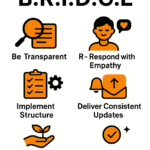The US hosts the highest number of international students globally, with statistics showing that it has over one million international students during the 2022/2023 academic year. A high-quality education, a multicultural environment, a unique curriculum, and ample opportunities are among the primary reasons why people choose to study in the US.
However, given that the US and Kenya have different laws, do these benefits, especially the opportunity bit, apply to Kenyan lawyers and advocates seeking to further their studies in the US? Does taking an LLM in the US build on your LLB-acquired knowledge and work experience, or does it feel like taking a second LLB?
In this inaugural piece for our Law Abroad feature, we juxtapose studying and the law in the US versus Kenya. Our guest for this feature, Brenda Kodawa, has traveled this path, so let us learn from her experiences.
Why I Chose to Study Postgraduate Law (LLM) in the US: Brenda Kodawa’s Journey

Brenda, a product lawyer, is one of the close to 160,000 Kenyans living and working in the US. Her career in the legal profession began here in Kenya, where she joined a Nairobi-based firm specializing in corporate and finance law after her pupillage.
However, her experience at the law firm was somewhat underwhelming. “I remember one time I was at this law firm, and I wasn’t really happy because I wasn’t getting any work from them.” Besides her legal academic background, Brenda is tech-curious, so she started coding to pass the time.
Brenda always wanted to pursue an LLM, and her new-found interest in tech, fuelled by a short stint as part of a telecommunications company’s legal in-house counsel team, pushed her toward cybersecurity law. Her search for a school offering an LLM with a concentration in Cybersecurity Law started in Kenya but led her to the University of Texas School of Law. She applied and gained admission into the program.
Studying an LLM in the US As A Foreign/African Student
According to Brenda, you can take an LLM in an accredited US law school for one of two reasons:
- To specialize or gain advanced knowledge in a specific legal field
- To meet the requirements for the US bar exam, take the exam, and practice law in the US
US LLM programs typically do not incline toward bar exams. Therefore, even individuals with a first degree outside the legal profession can apply for such programs and pivot into alternative legal careers after completing the program. Kenyans/ Africans getting an LLM in the US can specialize if they do not wish to practice law there.
On the other hand, if you want to practice law in the US, you should consider taking an LLM program with courses that prepare you for the US bar exam (meets specific criteria set by your state’s bar association). “So, you know from the get-go if you want to stay or not, which boils down to doing everything you can to stay or doing the bare minimum so you can finish and go home.”
Choosing Subjects
As previously highlighted, as an LLM, you can choose subjects according to your end goal: to practice or not practice law in the US. Additionally, school rules and state requirements for taking the US bar exam may also influence your chosen subjects.
For instance, in Brenda’s case, most of her classmates took the same classes offered to JD students to improve their preparation for the bar exam. Moreover, her school demanded that LLM students must take at least half of the courses in their specialization courses. Nonetheless, the students who did not wish to specialize took a general LLM.
Brenda decided to take more subjects focusing on cybersecurity and shelf elements like contract law and evidence for the bar prep program. “That’s just me. I wasn’t going to pay an exorbitant amount of money in tuition fees to learn something I already knew, and I would find in the bar prep, which I’m still paying for anyway; I want to learn interesting stuff.”
Nonetheless, Brenda admits that taking a general LLM to ease the bar prep is smart.
US Bar Exam Structure
So, for Kenyan lawyers who wish to pursue an LLM to practice law in the US, how does the US bar exam compare to Kenya’s? The US bar exam varies depending on the jurisdiction/state; hence, you can take either the Uniform Bar Exam (UBE) or the Multistate Bar Exam (MBE).
Uniform Bar Exam (UBE)
The UBE’s primary advantage is that it earns you a portable score transferrable to other UBE jurisdictions. Therefore, it eliminates the pressure to choose a US jurisdiction to settle down way in advance. It also expands your job search since 41 states have adopted the (UBE).
Additionally, if you score below the minimum passing threshold in the testing jurisdiction, you can transfer the score to a UBE jurisdiction where you meet the minimum passing score. However, the bar requirements are constantly changing across jurisdictions, so consult the bar admission agency in the state where you intend to study or practice beforehand. Moreover, some states may have additional pre-qualifications for the state bar exam, including a character fitness review, extra credit hours in specific subjects, transcripts from your LLB, or practical training.
Non-UBE Bar Exams
The primary difference between UBE and non-UBE bar exams is that the latter’s score is non-transferable. Second, while both exams feature the same structure, they have varying compositions.
On the one hand, the US bar exam has three parts: a multi-essay exam (MEE), a multistate performance test (MPT), and a multistate bar exam (MBE). However, the essay portion in a non-UBE features essay questions on specific state laws.
So, how many units, subjects, or topics must you pass to take the bar? “Unlike the Kenyan system where we have to get 9 Ps (passes), here these 9ps are all in one paper. They are not arranged in terms of areas of law; you get the question and must figure out which law it is. It’s a crazy system where you get about 200 multiple-choice questions (MBE). The trickery here is that when you read a question, you must figure out which law it discusses.”
When To Take The Bar Exam
“They take the bar exam twice yearly in February and July.”The US bar exam is a two-day event held nationally on the last Tuesday and Wednesday of February and July. Examinees take the MEE and MPT portions on Tuesday and the MBE on Wednesday.
“When most law students come here, the first thing they do is buy this bar prep program. It’s like something you buy and have professors on video teaching about the different techniques of passing the bar exam.”
According to Brenda, bar prep programs cost $3000 at a discounted price when she was prepping for the exam in 2019. Moreover, the bar exam itself cost $1500 (although you get early payment discounts). Therefore, besides tuition fees, these are crucial cost considerations when taking an LLM as a gateway to the bar exam so you can practice law in the US.
“At first, I was really confused and didn’t know what was going on, And I was thinking to myself, “You know what? I’m just trying to get through this first year, so I won’t get kicked out, right?” I didn’t have time to start looking for an extra $3,000 to pay for the bar prep. I thought, ‘I’ll sort this out later.”
Brenda decided to skip the July Bar exam and take it in February of the following year. However, such a decision depends on your visa situation.
Ms. Kodawa was an F1 visa holder (a student visa granting foreign LLM students eligibility to apply for OTP (post-completion optional practical training). An OTP allows you to stay in the US for a year post-LLM while taking short-term jobs and internships in the industry connected to your major.
“I was not even thinking about the bar exam because, at the time, I felt I needed to get a job to stay. Imagine, so here you are. You got your OPT, which starts in August at the latest, while you graduated in May. If you don’t get a job in 30 or 60 days from when it starts, you have to leave the country.”
Is Pursuing an LLM in the US Worth It for Kenyan Lawyers and Advocates?
According to Brenda, studying in the US is not without its set of challenges. “It is hard, and sometimes you’ll doubt yourself and wonder why you left your job and family in Kenya to come here and suffer.
But, if you come here, you’ve paid an exorbitant amount of money, so you try and make it work and make it worthwhile. As long as you’ve gotten your foot here, I think you can make it work.”
Brenda did indeed make it work by graduating with her LLM degree, passing the bar exam, and joining the job market. Join us for part 2 of this series as we explore the opportunities available to LLMs in the US, finding work as an LLM, and practicing law in the US.











